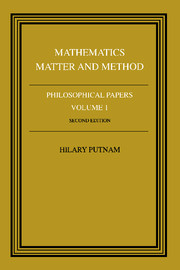Book contents
- Frontmatter
- Contents
- Dedication
- Introduction
- 1 Truth and necessity in mathematics
- 2 The thesis that mathematics is logic
- 3 Mathematics without foundations
- 4 What is mathematical truth?
- 5 Philosophy of physics
- 6 An examination of Grünbaum's philosophy of geometry
- 7 A philosopher looks at quantum mechanics
- 8 Discussion: comments on comments on comments: a reply to Margenau and Wigner
- 9 Three-valued logic
- 10 The logic of quantum mechanics
- 11 Time and physical geometry
- 12 Memo on ‘conventionalism’
- 13 What theories are not
- 14 Craig's theorem
- 15 It ain't necessarily so
- 16 The ‘corroboration’ of theories
- 17 ‘Degree of confirmation’ and inductive logic
- 18 Probability and confirmation
- 19 On properties
- 20 Philosophy of Logic
- Bibliography
- Index
16 - The ‘corroboration’ of theories
Published online by Cambridge University Press: 04 August 2010
- Frontmatter
- Contents
- Dedication
- Introduction
- 1 Truth and necessity in mathematics
- 2 The thesis that mathematics is logic
- 3 Mathematics without foundations
- 4 What is mathematical truth?
- 5 Philosophy of physics
- 6 An examination of Grünbaum's philosophy of geometry
- 7 A philosopher looks at quantum mechanics
- 8 Discussion: comments on comments on comments: a reply to Margenau and Wigner
- 9 Three-valued logic
- 10 The logic of quantum mechanics
- 11 Time and physical geometry
- 12 Memo on ‘conventionalism’
- 13 What theories are not
- 14 Craig's theorem
- 15 It ain't necessarily so
- 16 The ‘corroboration’ of theories
- 17 ‘Degree of confirmation’ and inductive logic
- 18 Probability and confirmation
- 19 On properties
- 20 Philosophy of Logic
- Bibliography
- Index
Summary
Sir Karl Popper is a philosopher whose work has influenced and stimulated that of virtually every student in the philosophy of science. In part this influence is explainable on the basis of the healthy-mindedness of some of Sir Karl's fundamental attitudes: ‘There is no method peculiar to philosophy’. ‘The growth of knowledge can be studied best by studying the growth of scientific knowledge.’
Philosophers should not be specialists. For myself, I am interested in science and in philosophy only because I want to learn something about the riddle of the world in which we live, and the riddle of man's knowledge of that world. And I believe that only a revival of interest in these riddles can save the sciences and philosophy from an obscurantist faith in the expert's special skill and in his personal knowledge and authority.
These attitudes are perhaps a little narrow (can the growth of knowledge be studied without also studying nonscientific knowledge? Are the problems Popper mentioned of merely theoretical interest – just ‘riddles’?), but much less narrow than those of many philosophers; and the ‘obscurantist faith’ Popper warns against is a real danger. In part this influence stems from Popper's realism, his refusal to accept the peculiar meaning theories of the positivists, and his separation of the problems of scientific methodology from the various problems about the ‘interpretation of scientific theories’ which are internal to the meaning theories of the positivists and which positivistic philosophers of science have continued to wrangle about (I have discussed positivistic meaning theory in chapter 14 and also in chapter 5, volume 2).
Information
- Type
- Chapter
- Information
- Mathematics, Matter and MethodPhilosophical Papers, pp. 250 - 269Publisher: Cambridge University PressPrint publication year: 1979
Accessibility standard: Unknown
Why this information is here
This section outlines the accessibility features of this content - including support for screen readers, full keyboard navigation and high-contrast display options. This may not be relevant for you.Accessibility Information
- 10
- Cited by
